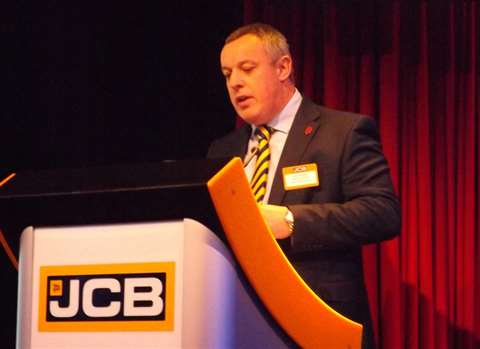CESAR’s impact on UK Construction equipment crime
13 November 2014

The CESAR security identification system for off-highway machinery has been highlighted by senior police and construction industry figures as a working crime prevention strategy, with machinery thefts down and recovery rates up since 2006.
This was the message from the Combined Industries Theft Solutions (CITS) Scams that Trash Your Bottom Line conference, which took place on 12 November at JCB’s headquarters in Rocester, UK.
Ian Elliott, chairman of not-for-profit industry body CITS and group head of security at contractor Clancy Docwra, said, “We have seen some fantastic results thanks to the introduction of the CESAR marking, and the UK now has the toughest responses as far as plant theft is concerned. Our strategy now is to stay ahead of the thieves.”
Tom Manson, detective chief superintendent at the Metropolitan Police, and Barry Murdie, who is the liaison manager for the Police Plant and Agricultural National Intelligence Unit (PPANIU) at Scotland Yard, both highlighted the gains that the industry had made by adopting CESAR.
Mr Murdie said, “In 2006, plant stolen around the UK was valued at £70 million (€88.5 million) a year, while recovery rates were less than 5%.
“Now we have over 1600 machines that are CESAR marked in the UK, and since 2008 1316 have been stolen, with 355 recovered. This is a recovery rate of 27% – similar to that of cars. Overall machinery theft is down 60% compared to the peak. CESAR is a crime prevention strategy that is working.”
Joint development
CESAR tags were developed by security technology manufacturer Datatag in co-operation with the UK Construction Equipment Association and the Plant Theft Action Group - a Home Office advisory group.
CESAR tags are highly visible and durable triangular identification plates fitted to construction equipment which contain a unique Datatag transponder.
The tamper-resistant identification plates are also used in conjunction with a number of other tags that are hidden within a machine, but can be read with a Datatag reader.
There are various other security measures behind CESAR tagging as well, including hundreds of miniature Datadots embedded throughout the machine.
Each machine and CESAR system is permanently registered on Datatag's secure and accredited database which is accessible 24/7 for Police and customer enquiries.
Kevin Howells, managing director of Datatag ID Systems, said CESAR was now factory-fitted at over 50 production facilities, with the company targeting international expansion in the coming years. However, Mr Howells also warned of other growing challenges to the industry.
Other threats
“We are now seeing old, non-CESAR-marked equipment being targeted by thieves,” he told delegates at the event, “And theft of fuel is also a growing problem. We had one construction company that estimated its losses from the theft of fuel from machines at £2.25 million (€2.84 million), and other reports pointing to around 10% of fuel used in the construction industry being stolen.”
Mr Howells said Datatag was developing a new product to try to tackle fuel theft dubbed Venom. This is a fuel additive that contains a code that can be unique for each depot or even vehicle. It is administered to fuel by trusted security staff, and can be identified even if it is mixed with other Venom markers and fuel.
Meanwhile, Iain Anderson, managing director of UK rental company GAP Group, told attendees that his company, like most other rental companies, had experience of plant theft. “From January this year to October this year, we have experienced losses totalling around £100000 (€126369) from stolen equipment and the damage to property that the criminals cause.”
Mr Anderson also highlighted fraudulent hire as a crime that GAP and other rental companies came up against.
“We’ve taken many measures from installing CCTV, fencing and gates to locking away the most stolen equipment – particularly mini excavators - in special areas within our depots at night.”
Working together is key
However, Mr Anderson had one strong message for the industry about tackling construction equipment crime. “Exchange of information is vital if we’re going to reduce this – we have to work together more than we currently are.
“The thing to remember is that when a machine is stolen from your depot, it’s not just your company that it is happening to – it’s the industry as a whole.”




